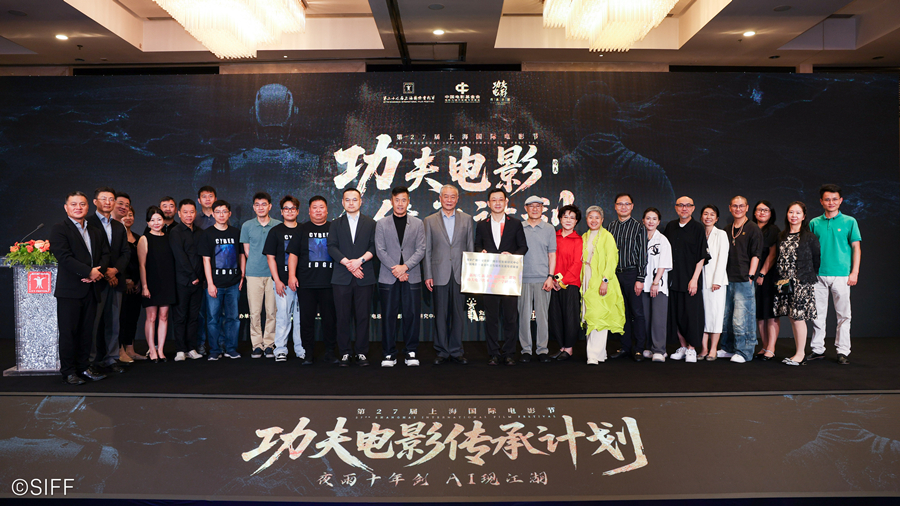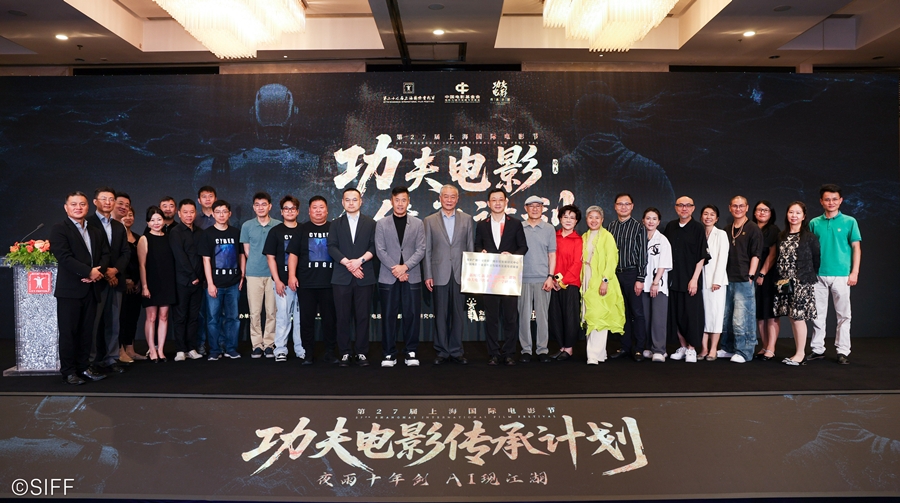Bruce Lee, Jackie Chan and Jet Li are set to appear on the big screen in AI-generated form, after a new initiative to remake 100 classic Chinese martial arts films using artificial intelligence was announced on June 19 at the 27th Shanghai International Film Festival (SIFF).

Leaders, executives, partners and guests pose for a photo at the launch of an initiative to remake classic kung fu films using artificial intelligence during the 27th Shanghai International Film Festival, Shanghai, June 19, 2025. [Photo courtesy of SIFF Organizing Committee]
For the first phase of the project, Shanghai Canxing Culture & Media Co. will license 10 classic Hong Kong kung fu films from its archive — including "A Better Tomorrow," "Police Story," "King of Beggars" and "Swordsman" — under the "All-time Kung Fu Legends — Grand AI Revival of 100 Selected Chinese Kung Fu Epics" banner.
The company will collaborate with AI teams and animators to digitally reboot and adapt these martial arts classics.
Zhang Pimin, chairman of the China Film Foundation, said Chinese kung fu films are Chinese cultural treasures that capture the "chivalric spirit" that emphasizes the protection of the weak.
Zhang said the project will feature classics such as "Once Upon a Time in China" and "Fist of Fury" and marks an important step in blending traditional culture with modern innovation through AI.
"From Bruce Lee breaking cultural barriers with martial arts to Jackie Chan conquering the world with kung fu comedies, Chinese kung fu films have always been a golden brand for sharing China’s stories and values," he said, urging cross-sector collaboration to carry the legacy of these films into the digital era. "With this project, we can use technology to help these classics transcend time, keeping the heroic spirit alive in the digital age."
The project will not restore the original films, a China Film Foundation spokesman told China.org.cn. Instead, it will use AI and digital animation techniques to remake and reimagine classic titles.
He Tao, deputy director of the Industry Research Institute at the Development Research Center of the National Radio and Television Administration, said the remakes are designed to deliver better visual effects and faster-paced storytelling to better align with contemporary audience preferences.
"A Better Tomorrow: Cyber Frontier," developed by Quantum Animation Studios, will be the first film produced under the initiative and is described as the world's first fully AI-produced animated feature. The film reimagines John Woo's classic using AI-driven character modeling, scene rendering and motion capture, blending traditional and cyberpunk elements for international audiences.
AI has revolutionized animation production cycles and costs, said Zhang Qing, chief producer at Quantum Animation Studios.
"Traditionally, an animated feature required thousands of staff and five to six years. For 'A Better Tomorrow: Cyber Frontier,' a 30-person team is producing a theatrical release," he said.
The AI films will also target Gen Z audiences worldwide through multilingual dubbing and partnerships with international streaming platforms, Zhang added. "A Better Tomorrow: Cyber Frontier," set for theatrical release next year, is being shopped for global distribution, with its producers in talks with Netflix and Disney+.
The project also aims to set technical standards for virtual production and develop new models for storytelling, organizers said.
Shanghai Canxing Culture & Media Co. Chairman Tian Ming also announced that subsidiary Canxing Productions will invest 100 million yuan ($14 million) to co-fund selected projects, taking part in revenue sharing, joint copyright and derivative development rights.
"Today we're issuing an open invitation to AI production and animation companies worldwide," Tian said. "With 100 Hong Kong film IPs available for licensing and extensive archival footage at your disposal."
However, as technology evolves, Tian stressed that human creativity must remain central. "AI is the brush, but creativity is the soul," he said.
"Algorithms can restore 4K resolution but cannot replicate an artist’s aesthetic insight," said Tian. He added that while technology transcends borders, culture needs to connect with people on a deeper level and Eastern stories require contemporary interpretation with a global vision.
"Remaking classics calls for creative renewal — honoring the originals while reinventing visual philosophy," Tian said.


 Share:
Share: 




 京公網(wǎng)安備 11010802027341號
京公網(wǎng)安備 11010802027341號